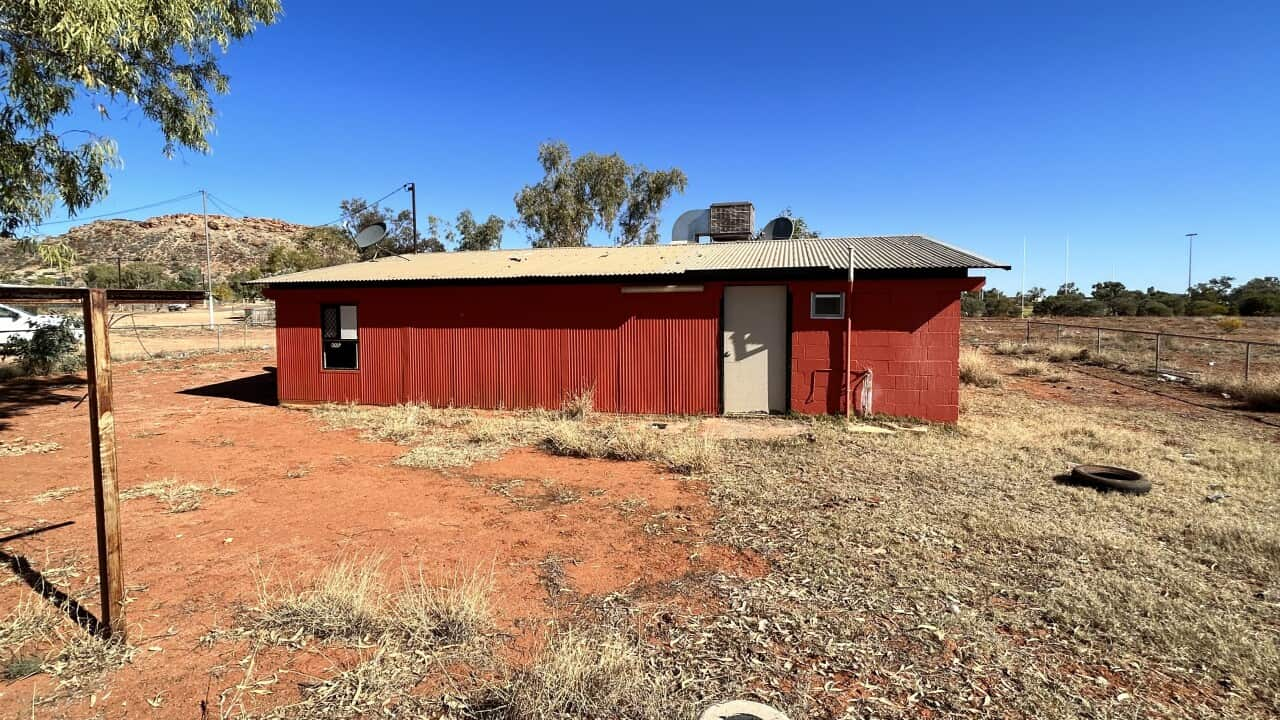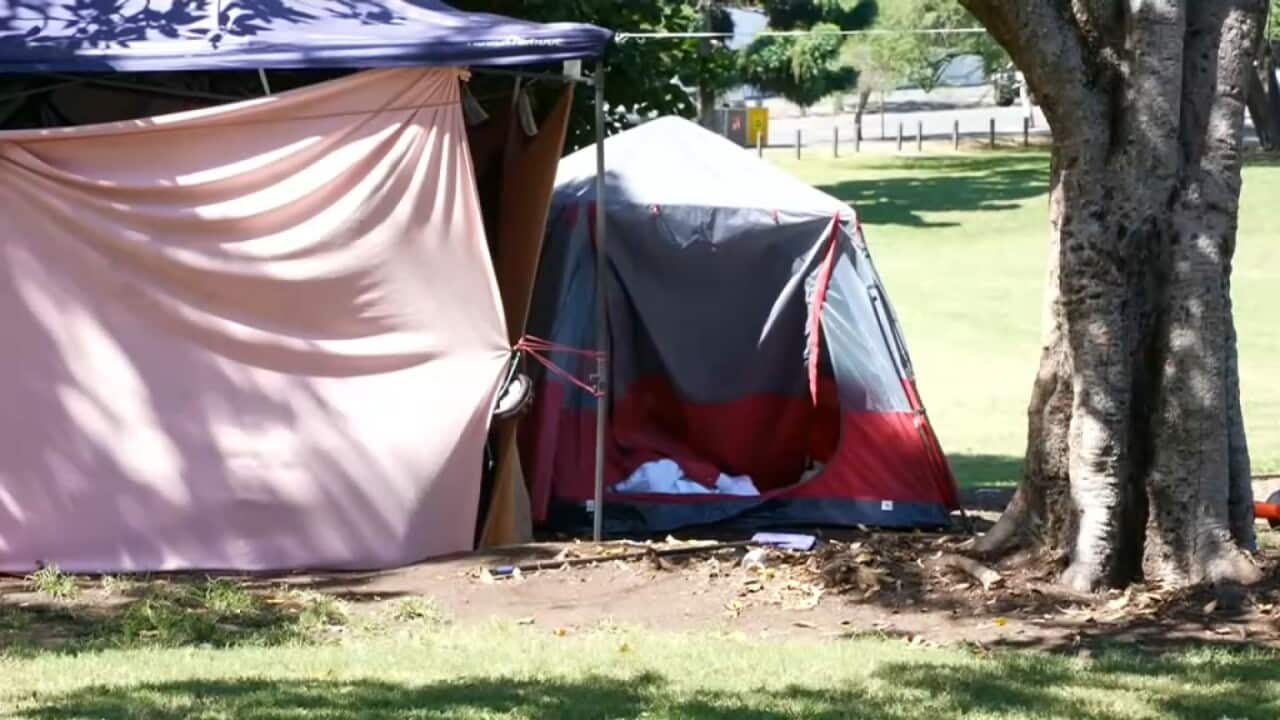Smoke trails from a morning fire, heating two-minute noodles in a small silver pot. It's a beach-side breakfast with spectacular views, but the living is tough.
Seventy-two-year-old Jane Alimankinni sits on a foam mattress in a black floral dress. She sips tea from an orange plastic cup.
“I live right here, at [the] Beach,” the former teacher and artist explains.
“I'm diabetic, a dialysis patient. I go Monday, Wednesday and Friday to dialysis treatment.”

Jane Alimankinni sits with her Tiwi Islander family at her beach-side camp in Darwin Source: NITV / Laetitia Lemke
She says a health bus takes her to appointments, but today she is too sick to travel.
Managing her stomach flu from this campsite is challenging.
She uses taps at the nearby public toilet to shower and her daughter walks the dirty laundry to St Vincent de Paul Society's (Vinnies) Ozanam House homeless services in Stuart Park.
“Sometimes they take me if I can get up,” the Tiwi Islander explains motioning to her daughter and relatives playing cards on a matt nearby.
“I need about one [person] on this side and one [person] on that side to lift me up… I can't even get up on my own.”
Patient privacy policies mean there are no answers to how Jane missed out on the aged care services that should be available to her, or why the NT Health Department and Royal Darwin Hospital have discharged her to live in these conditions when similar patients are housed in the hospital.
Jane remembers having a room at an Aboriginal hostel a couple of years back, but says she gave it up to live with family and when that didn’t work out she moved here.
For two years now she has lived by the sea.

A family leaves the St Vincent de Paul Society centre in Stuart Park, on the fringes of Darwin city Source: NITV / Laetitia Lemke
“One of the things that shocked me when I first came to Darwin was the amount of people, particularly with complex needs who were sleeping on the street,” Jocelyn Cull says.
The NT’s homelessness rates are about 12 times higher than the national average.
Short-term accommodation is stretched, and in a public housing crisis, Jane now faces wait times of up to 10 years for a one-bedroom apartment.

Born in Mt Isa, Vanessa Marshall has been homeless since moving to Darwin from Alice Springs six year ago. Source: NITV / Laetitia Lemke
Vanessa Marshall from Queensland says she is one of those people and that sleeping rough in Darwin for six years has been safer than being at home.
“I like this place because I’m a sort of member too,” Vanessa Marshall says of Vinnies' Ozanam House in Stuart Park.
“I go to sleep out back, I’m a guest.”

The St Vincent de Paul Society's Ozanam House in Stuart Park opens the doors are half past seven Source: NITV / Laetitia Lemke
“Nobody would have breakfast, nobody would have a shower, nobody would be able to wash their clothes,” she says.
This week the service is busy preparing for its CEO sleep out - where some of the most powerful people in the Territory will sleep rough to raise money for the cause.

People affected by homelessness access breakfast services at Ozanam House in Stuart Park Source: NITV / Laetitia Lemke
But growing services to meet demand is proving challenging, with Vinnies' plans to grow services hitting serious hurdles.
“The [Ozanam House] building is at the end of its functional life, so we need to get out and find a new location,” Vinnies Ms Cull says.
"Part of the reason we are also moving is – expansion of service.
"Our service hours are from about eight o’clock in the morning til midday and then we shut the door."
She says that there are "very vulnerable people that need that continuity of care"
"But also they need somewhere to stay so the idea of moving to a permanent location is we keep our existing services but we have a place that they can stay that is culturally appropriate as well."
Working with Aboriginal stakeholders, Vinnies has mapped a new facility that includes short-term accommodation, set up in 'glamping' style pods, with health, rehabilitation and legal services embedded at the site.
"It’s a common sense approach to give people somewhere to stay," Ms Cull says.
"At the moment our issue is that we are driving people around the different locations… they are getting moved on… but they are still there and they have still got nowhere to stay."
Vinnies CEO Rob Lutter told NITV that the organisation has had "over a hundred meetings" in the last three years to "try and get this across the board".
“This is NGO led, we are saying to government 'this is the right solution'” he explains.
But the service is still struggling to access a block to build on.
As a temporary measure, Vinnies is setting up services in the business district of Coconut Grove in Darwin's northern suburbs.
That has drawn concern from neighbours, and the ire of local Labor members Natasha Fyles and Brent Potter who have spoken against the development on behalf of constituents in their seaside electorates.
With plans in place to keep clients and neighbours safe, the development has been backed by the Development Consent Authority and will go ahead.
“We want to be good neighbours in Coconut Grove,” Vinnies CEO Rob Lutter says.
“And when we get a permanent site we want to be good neighbours at the permanent site as well.”

Jane Alimankinni drinks tea at her camp near a Darwin beach Source: NITV / Laetitia Lemke
"[That's] from not only the decrease in health services [demand] but also policing, antisocial behaviour and all the other bits and pieces that you find,” he says.
For 72-year-old Jane the improvements can’t come soon enough.
She needs urgent housing and health solutions and hopes they will come before the torrential rains of the wet season return.
A spokesperson for the Chief Minister says the government will continue work with Vinnies to find a new home for services.





